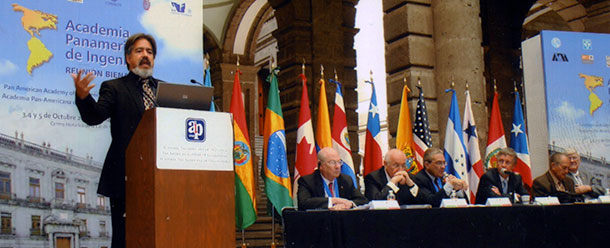Vanegas leads international engineering forum in Mexico
Engineers, educators and policymakers from throughout the Western Hemisphere gathered in Mexico City Oct. 3–5 to discuss challenges facing the Americas at a policy forum hosted by the [Pan American Academy of Engineering] (http://www.apingenieria.org/indexen.htm) and organized by Jorge Vanegas, president of the academy’s policy forum and dean of Texas A&M’s College of Architecture.
The event’s speakers, which included Mario Molina-Pasquel Henriquez, winner of 1995 Nobel Prize in Chemistry, were grouped into five discussion panels investigating the topics of climate change, science, technology and innovation, engineering education, engineering for the Americas, and hazards and natural disasters.
Walter Gillis Peacock, director of the college’s [Hazard Reduction and Recovery Center] (http://hrrc.arch.tamu.edu) , participated in the hazards panel, making a presentation on risks and natural disasters.
The discussions were held to inform academy members on these wide ranging topics which will be addressed in the organization's forthcoming work plan, said Vanegas, who serves as technical director of the academy and sits on its executive board of directors. The work plan is a set of strategic initiatives, programs and projects the academy's president has proposed as academy members' focus of activities in 2012-14.
As PAAE technical director, Vanegas guides the development of the organization's programs in education, science, technology and innovation and also serves as its liaison with several international organizations, including the [Organization of American States] (http://www.oas.org/en/default.asp) and the [Inter-American Development Bank] (http://www.iadb.org/en/inter-american-development-bank,2837.html) .
Created in 1996 by the International Directorate of the Pan-American Federation of Engineering Societies, the PAAE aids the development of each country in the Americas through the contributions of distinguished engineers' intelligence, experience and time.
Vanegas' duties as the policy forum's president included developing the forum in three languages, Spanish, English and Portuguese, identifying and inviting distinguished speakers for each panel, and providing a summary and closing address for the event.
Previous post
Tags
- architecture
- construction science
- events
- global college
- hazard reduction & recovery
- interdisciplinary
- landscape architecture & urban planning
- lectures
- outreach
- partnerships
- planning
- rss
- sustainability
Related Posts

Oct. 29 symposium spotlights college, faculty research

Feb. 9 conference showcased sustainable African land projects

Oct. 23 symposium spotlighted college, faculty research

Preservation experts focus on ‘Disaster’ at 13th CHC symposium

2015 Rowlett lecturer championed shaping the future by design
Follow Us
Facebook Twitter Vimeo Youtube Flickr RSS
Recent Posts

Planning prof heads study of disaster housing aid

A message from the dean

Former student remembered as expert planner

Leading educator named new head of Architecture Dept.





_thumbnail_small.png)
